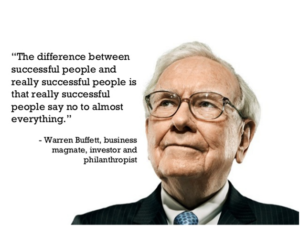Tag Archive for: time management
That commute home is where it hits you, or maybe it’s when you finally walk out of the office door for the evening….what did I get done today? You look at your To-Do List at the end of the day and find that it’s actually grown since the morning started out.
Some days, productivity escapes you.
Now, there could be some very good reasons for this. It may have been a day of putting out a lot of unexpected fires, or for some other reason, priorities shifted beyond your control.
What keeps you from getting as much done every day as you can? What if you set a goal that you would be more productive this week? Would you know what the barriers to your productivity are?
How do you become more productive?
Decide that you want to experiment with productivity to make this more of a daily priority. You can explore what gets in the way of a productive day. There are certain barriers to productivity that are important to understand:
Procrastination (see my article next week) – Ah yes, this is putting off those really big scary tasks and never seeming to find the time for them. Recommendation: Make a list of all of those things that you are procrastinating about then put a small plan together to address each of those NOW, today. What is the smallest you can do that will at least get you moving on this activity?
Perfectionism – it has to be done perfectly….OR ELSE! Challenge that perfectionist side of you to take a break! Instead of perfection, strive for progress every day and don’t evaluate what you did wrong or not good enough, but instead what moved forward, even if slowly.
Not having clear and realistic goals. Do you know exactly what you need to accomplish each day? Take some time to set goals for yourself both personally and professionally….even if it’s at the weekly level. Set goals every week before the work week begins then cascade these goals daily, even if in bite-sized pieces…make slow but steady progress.
Not prioritizing your work and focusing on the most important things. Your To-Do List maybe 3 pages (yes that happened to me once) but prioritization is what will determine your productivity. What are the most important things that need to get addressed? You can number rank them or do the ABC method. Whichever works best for you.
Not having the right tools, or not using them correctly. It’s important to have a task and project planner. I use the Franklin Covey method. Others use Outlook, for example. This is a place where you put your calendar, priorities for the day, and allows them to all roll up to weekly and monthly tasks.
Lack of understanding around peak performance times. There are times where you do better work than others. Are you a morning person? Afternoon? Evening? Plan to tackle your most difficult and challenging work (see Procrastination list) during your peak times. Really notice when you peak in energy throughout the day and manage your work effort by those peaks.
Holding on to things you really need to let go of. Delegate, delegate, delegate. Sometimes you may have to spend money to become more productive by hiring a virtual administrative assistant or having the dry cleaners deliver and pick up at your home. At work, look for others who could benefit from your delegation of assignments.
I go to bed so late and wake up tired. Your productive day begins the day before. You can plan tasks, clean up your office space and come to a new organized area every morning where you know exactly what you need to do to hit the ground running.
Eliminate interruptions…turn your phone and notifications off for a little while. All the interruptions can wait for you to focus on what you need to get done.
ACTION CHALLENGE
Do any of these barriers resonate with you? What can you work on this coming week to increase your daily productivity? Experiment with best techniques for you.
I would love to hear your thoughts.
Lupe S. Wood, MS, PCC, is a certified Career/Executive Coach. She coaches individuals and leaders to career fulfillment, transition, and advancement. She also consults for results with businesses and solopreneurs. Her background includes 12 years in senior leadership for a Fortune 100 corporation and 7 years as a coach, with a Master’s degree in Organizational Effectiveness and Executive Coaching.
For more information, please visit my website at www.upcoached.com
Does this sound familiar? Your boss gives you an important assignment. It’s not due for 3 months but will take a bit of time to research and present a solution. Days pass, weeks pass…lots of urgent work to attend to. You haven’t forgotten about the assignment, but you keep putting it off and putting it off until you realize you only have a week left and haven’t even started to look at the assignment.
Procrastination happens to all of us. Before the time of electronic returns for your taxes, US Post Offices would be flooded with people on the evening of 4/15. There would be long lines of cars and the post office having postal workers out collecting the taxes to be mailed. It was an annual ritual.
Yes, procrastination happens to all of us.
It’s the act of putting things off for another time, not addressing the “important but not urgent” items.
There are several reasons for procrastinating:
Fear – fear of failure, fear of not being perfect, fear that you don’t know what you’re doing or fear of what happens when you do it (for example, I owe on my taxes!).
Lack of knowledge – You truly don’t know how to do it and don’t feel comfortable asking someone.
Perfectionism – You just know you can’t do this perfectly, so you don’t do it at all.
Lack of organization – This is just so big and complex. Where do I start?
Complexity – You don’t know how to plan out a complex project and task it out.
Busyness – You said “yes” to something when the reality is that you are over capacity and never should have agreed to it in the first place.
Rather than the address at the moment, it gets placed on a shelf, until there is just no choice but to move forward on it. And now, it’s a rush to get something done with a lot of guilt and bad feelings for not doing something earlier!
How to break the cycle:
1. Forgive yourself! Studies actually show that individuals are very hard on themselves during a procrastination event. “I should have been working on this earlier.” “I should have asked for help.” “I should have just said “NO.” This negativity spirals and can also keep you locked in procrastination.
2. Take some time to understand your procrastination style. Understanding what makes you procrastinate can help you address the situation when it arises. What makes you procrastinate? For myself, I know that it is complexity, busyness, and sometimes downright cold fear.
3. Write it all down. Capture all of those things that may not be written down, but keep you up at night. For example, I know there are a lot of house tasks we need to address in our home, but none of these are written down… reseal the deck, have a roofer out, blacktop the driveway. These things can gnaw on you until you address them and step one can be simply making a list.
4. Ask for help! There are so many ways to address what needs to be done…virtual assistants, handymen, your co-workers, someone you trust. Understand that the task won’t go away…hire someone to help or delegate it.
5. Ask yourself, what’s bothering me…what’s uncomfortable about this task? Is it something I don’t know how to handle or something so visible that if I make a mistake it will be huge? What is making you avoid this task? Doing this analysis can help you to decide on what you need to do to make this happen.
6. Plan it out. I like to keep lists on my Franklin Covey planner so that these kinds of efforts don’t fall to the wayside. Plan the smallest amount of work you can do each week.
7. Let someone hold you accountable. Share with a trusted friend, advisor, coach. Have them keep you accountable to keep moving forward, no matter what.
I laugh at the expression of getting “a round tuit”. There are a lot of “round tuits” out there. Decide that you will instead go for getting motivated…motivated to tackle those things that you have been procrastinating about.
ACTION CHALLENGE
Do you know your procrastination style? Take some time this week to break the cycle of procrastination and move forward.
Lupe S. Wood, MS, PCC, is a certified Career/Executive Coach. She coaches individuals and leaders to career fulfillment, transition, and advancement. She also consults for results with businesses and solopreneurs. Her background includes 12 years in senior leadership for a Fortune 100 corporation and 7 years as a coach, with a Master’s degree in Organizational Effectiveness and Executive Coaching.
For more information, please visit my website at www.upcoached.com
“Um, NO, I think not, well, maybe not, um, OK, not right now, that is of course….unless you really need me to.”
How good are you at saying “No?”
The word “no” is truly a hard word to remember and to use effectively. Need more control over your time and your day? There are so many time management tools out there including prioritized lists, calendars, daytimers, Franklin Covey Timers, Outlook, etc. etc.…all in an attempt to get more done every day.
Yet sometimes, you can free things up considerably by just saying the magic word, “No.”
Consider this quote by Tony Blair, former Prime Minister of England: “The art of leadership is saying no, not saying yes. It is very easy to say yes.”
Where do you draw your boundaries?
Boundaries can disappear in our lives for several reasons:
1. I can’t possibly say no to _______________. There are certain people or situations in our lives that are especially difficult to say no to. It could be your boss, your parents, your children, your friends.
2. You may have people around you who are skilled at getting you to do what they want you to. They don’t mean any harm…they just want to take up your time with their needs and requests and know exactly which of your buttons to push.
3. You want to please people.
4. You feel validated or needed through requests of your time.
5. You would feel so guilty (similar to number 1) if you said no.
6. You think it’s a part of your job to never say no.
7. As Tony Blair stated above…it’s just easier to say yes and let your boundaries be crossed than to say no and deal with the fallout from that…negative reactions from others or yourself.
If you recognized yourself in any of these statements, then your boundaries may need a little tune-up to understand where they are and how to effectively protect them.
Many times you don’t even realize your boundaries are being crossed, but a sure-fire indication is if you find yourself feeling overwhelmed, or resenting what you’re doing, or both.
I served on the board of directors for a non-profit. It was a gratifying yet very time-consuming commitment. I was finally forced, with commitments around growing my coaching business to bow out and resign. A few months later, I was asked if I could help with something. I had already said I was done, but they were asking me so persuasively. It took a lot of conviction, but I said I was so sorry and no. Then a few weeks later, I received a beautifully engraved crystal bowl as a thank you for my years of service, with a note asking for my help. This was a huge test. They really needed me!
One of the things I did was to stop and think before I said yes. I realized that there were other capable board members who could step up to the plate as well. It was so difficult, and guilt provoking, but yet again, I had to say no.
I was saying no to protect the prioritization in my work and life. But it takes effort to determine, ahead of time, what is most important in your life. An examination of boundaries can begin there…by prioritizing where and how you want to spend your precious time, guilt-free.
Saying no can mean overcoming guilt. It’s about really examining what your motives are, and deciding the best option for yourself at this time. Saying no means building up security within you that says “I don’t need this acknowledgment; I can do this for myself.” Saying no takes practice, but like all things, it helps to reconsider your goals and priorities before launching into the yes.
If saying no is just too difficult, try this response I once learned from a very wise woman, “My answer is no at this time but if I can, I’ll get back to you.”
ACTION CHALLENGE
What do you need to say NO to, today? How can you constructively look at keeping your boundaries and making informed decisions on what to take on?
Lupe S. Wood, MS, PCC, is a certified Career/Executive Coach. She coaches individuals and leaders to career fulfillment, transition, and advancement. She also consults for results with businesses and solopreneurs. Her background includes 12 years in senior leadership for a Fortune 100 corporation and 7 years as a coach, with a Master’s degree in Organizational Effectiveness and Executive Coaching.
For more information, please visit my website at www.upcoached.com
Through this series, you’ve set big bold goals, created a Vision, and put together a plan. Now it’s time to look at how you get the tasks completed toward your career goals for the future.
You have a Plan, the “how” of reaching your big bold goals, but you need the “when,” that is scheduling the work to be done.
A close friend and mentor of mine once said, “Having a schedule always works!” It’s not enough to have a plan. You now need to figure out how to address extra effort into your busy day to day schedule.
Stephen Covey was a time management expert that many of you may have heard of. He talked about the strategic effort of working on long term goals as something that is always “important but not urgent.” Think about the term “important.” This is the work of your big bold goal. It is important but, not as urgent as getting those requests from your boss handled or spending time to rescue a project in trouble at work. Those are urgent. The work of a big bold goal rarely is urgent.
So how do you find the time to address the non-urgent, longer-term priorities of your career and life? I say you make the time happen with determination and scheduling.
A big example for me is writing. As you have probably noticed, I love to write. My goal is to write an e-book. However, try as I might, I can never seem to find the time. This is definitely a big bold goal for me.
Recently, I started blocking time on Thursdays to write, and to address my business development as an entrepreneur. I had always tried to make it Friday, but things would always get in the way. I have changed it to Thursdays and while I’m still available for a few clients, for the most part, this is my day to work on important-but-not-urgent big bold goal efforts. Turns out that Thursday may just be the perfect day for me, so far.
With the urgent items taking up most of our day, you have to be mindful of the important-but-not-urgent.
This is your future. This is the strategic effort that will lead to achieving your goals.
Think about how you plan your day. Do you take the time to prioritize items for the day? Is all of it important and urgent only? Most of us react to the urgent…these usually require little planning…it’s the busyness of every day. Yet, our big bold goal actions require planning as important-but-not-urgent. How do you address the important-but-not-urgent?
Stephen Covey has a famous video on how to fit everything into the day. I highly recommend taking the time to watch this 6-minute video. It drives home the need to schedule your “big rocks” first into your day. Stephen Covey Big Rocks Video.
What I love about this video is how it stresses that the important and urgent tasks will always win out, and a fair amount of procrastination will as well. Where you want to address your actions for the big bold goals is in planning for the important-but-not-urgent.
Some planning techniques include:
1. Schedule time on your calendar in advance to get the tasks done. I like to block time out in my calendar for certain work. This allows for any interruptions that may appear but still keeps you focused on the strategic actions you need to take.
2. Resolve to make incremental progress every day. If you have a task like “Gather all of my old performance reviews” broken out, say from the bigger step of “Update my resume,” you can resolve that for today, you will find at least 2 performance reviews. You want to break it down to doing the smallest amount of effort to feel that you’re making progress toward your goal.
3. Adopt a trigger to help you do the actions. For example, most of us don’t think about brushing our teeth any longer…it gets triggered by a meal or first thing in the morning or before you go to bed. You can set a trigger for your goal to work in the same way. Say, first thing in the morning, every morning, devote time, or last thing in the evening before you leave work or finish dinner. The outside event will trigger what you need to do.
4. Allocate an extra hour in your day…either start work earlier or leave later, or adjust to doing the work at home, depending on the goal. I once found that getting to work an hour earlier to work on these goals was an effective way to start the day.
5. Resolve to stay true to your commitment. Set a daily or weekly goal on the action you’re taking.
6. Reward yourself for the progress you’ve made. Working on longer-term goals is like a workout program. You may not see immediate results, so a small reward can encourage you to keep going for the longer term.
7. Share what you’re doing with others. It helps to build accountability and persistence.
A long term goal can seem like a journey. Be sure you pack and plan what you need in advance. These planning techniques can help.
ACTION CHALLENGE
Look at planning time to work on the important-but-not-urgent strategies and tactics of achieving your career goals. It’s time invested in you and your future. Find a way to make it happen every day.
Lupe S. Wood, MS, PCC, is a certified Career/Executive Coach. She coaches individuals and leaders to career fulfillment, transition, and advancement. She also consults for results with businesses and solopreneurs. Her background includes 12 years in senior leadership for a Fortune 100 corporation and 7 years as a coach, with a Master’s degree in Organizational Effectiveness and Executive Coaching.
For more information, please visit my website at www.upcoached.com
How’s the new year/new decade going so far?
Did you set any new year’s goals or resolutions? How are those going?
You have probably heard some of the statistics around resolutions. Nielsen did a study a few years ago showing that only 64% of resolutions last longer than the first month, and 46% last longer than six months.
While some of these numbers are better than I thought, they also show that, basically, resolutions don’t work! However, I have something that may help your goals stay in place longer than the statistics show.
It starts with writing out a robust vision of the future.
Now, I’ve written about vision before Vision and Values and Achieving Career Goals with Vision and if you are a client, you know that I always begin with helping you to define the vision. Vision is so important because this becomes the foundation for setting your strategies and goals to attain that vision.
Vision can be around any aspect of your life…relationships/family, health, free time, vacations, etc. This article focuses on careers. As you set the vision, it’s important to dream big…very big. I like to think about it this way….if you could have, do, or be anything in your career, what would it be?
This is the first question you want to ask yourself in creating a vision.
The second question is, around what is important about that vision? What about the vision is compelling for you? What makes you think about this as a vision? Having the reason for your vision helps to inform the importance of the vision for you personally.
Example of a career vision: I see myself promoted to Assistant Vice President of Marketing. I have Directors reporting to me and we are focused on exceeding the goals of the corporation with effective metrics and Key Performance Indicators. Becoming a VP will fulfill my desire to achieve and be recognized in the corporation. It will also present me with the career challenges and financial compensation that I’m looking for in the future.
Another example: I see myself as an entrepreneur, running a successful bakery, and café. I have a passion for baking and love serving others so this would be an ideal situation for me to pursue.
The second is a simpler version of the vision but works equally as well.
The vision should be stated in terms that make it robust, compelling, personal, (although you can share), and truly paints a picture of the future that you want to have.
About 20 years ago, I was inspired to write a vision for my future based on listening to some Tony Robbins (amazing speaker and motivator) tapes. The vision I wrote was to go to Hawaii for the first time (Vacation vision). The second was a Career Vision to get promoted two levels above where I was…to Sr. Director.
As I wrote these visions, I didn’t know how I was going to achieve them, I only focused on what, and that’s important as you are visioning. Don’t get caught up in the practical wisdom. With my two visions, I had wanted to go to Hawaii for a while but had never declared it as a vision. For my career, I had been waiting for an overdue promotion to one level up…two levels seemed an amazing vision.
The wheels were set in motion once I defined the vision. I didn’t even write specific goals on each of these but thought about the visions daily. I started taking actions (very important) to achieve the vision…like researching more about Hawaii…where to stay, how much it would cost, etc. I also began to make it clear to my leadership that my goal was to be promoted, and began to act as if I were already at that level.
The result…my husband, son, and I vacationed in Hawaii that summer, and I was promoted that same year, right after I returned from Hawaii! I received the second promotion six months later!
This convinced me of the power of a vision, and while I don’t always practice it for myself, I was reminded of this powerful practice recently through a coach collaboration group I’m working with.
I kept my written vision in front of me every day and dedicated some time to think about it. This is one way to keep it before you. Another is a vision board that you can do physically or electronically as well. Anything that will help keep the vision before you is important.
Is it time to think about what you really want in the future? The beginning of a new year and new decade are perfect times to vision what areas of your career and life you would like to focus on. Start from a clean slate. Forget the past…this is all about you having the career and life you really want!
ACTION CHALLENGE
Consider your career. Where do you see yourself in the next year/five years? What is your vision? Write this down and be sure to include what’s important to you about achieving this. Then use a vision board or other reminders to inspire you daily.
I would love to hear some of your successes out there with setting a Vision!
Lupe S. Wood, MS, PCC, is a certified Career/Executive Coach. She coaches individuals and leaders to career fulfillment, transition, and advancement. She also consults for results with businesses and solopreneurs. Her background includes 12 years in senior leadership for a Fortune 100 corporation and 7 years as a coach, with a Master’s degree in Organizational Effectiveness and Executive Coaching.
For more information, please visit my website at www.upcoached.com
Time management is always important, but even more so in this time of COVID 19.
The virus is all about disruption, and sometimes we forget that could also apply to our daily routines.
How long has it been now? It seems as though we have been in the pandemic quarantine for months, yet I can trace back to March 13th, 2020 as being the date when it officially started for me. That’s 4 weeks ago from today, as I write.
Time almost literally stopped. I found myself in the midst of the tsunami, having to hurriedly prepare for life under quarantine, and that became a problem for all of my regular work that still needed to get done.
As I finally caught up on email and daily to-do lists recently, I realized that they all stopped on that fateful Friday the 13th. It seems I’ve been a bit distracted since then, as have we all.
When the brain is in survival mode, it’s difficult to concentrate on anything else.
I had to re-invent how I tackle my daily/weekly/monthly to-do list. I set about to experiment with some different approaches. I actually made a game of it, trying different techniques every day.
- Set aside time on the calendar for strategic work
- Hold myself accountable with a partner
- Change how I listed items
- Tackle lower priority items at night after office hours
I was trying to find a new way to get it all done when an old way came to mind.
I love the story from 1918 (ironically, the time of the last major pandemic in the world). Charles Schwab was the president of Bethlehem Steel. He was in search of better ways to get more done for himself and his team, and so he hired a management consultant named Ivy Lee.
Lee had a method for time management. He was so convinced that this method would work, that he told Charles Schwab to try it for 3 months, and then send him a check for whatever he thought the method was worth. So, Schwab and his executive staff tried it for 3 months. At the end of the time, Schwab wrote Ivy Lee a check for $25,000 (over $400,000 now).
The method is simple yet powerful. In my “corona confusion,” I remembered it and tried it out again:
- At the end of each workday, write down the six most important things you need to accomplish tomorrow. Do not write down more than six tasks.
- Prioritize those six items in order of their true importance.
- When you start the next day, concentrate only on the first task. Work until the first task is finished before moving on to the second task.
- Approach the rest of your list in the same fashion. At the end of the day, move any unfinished items to a new list of six tasks for the following day.
- Repeat this process every workday.
I can tell you this works! I think the basic premise of why is that it is so simple! It also forces you to focus on what is most important – your priorities for the day, one at a time. It helps you to ruthlessly prioritize the most important work. I’ve found that the things that didn’t make the priority may not have had to get done anyway. It also keeps you from multitasking which studies have shown is much less effective than a single focus.
Is it time to reinvent your daily work and priorities?
Please remember to be kind to yourself and others. You’ve been through a lot. We all have. Maybe there really are some things that don’t need to get done during this time.
ACTION CHALLENGE
Please try the Ivy Lee method above and see if it may bring more productivity to your day. Also, I am still offering a free coaching session to all of you through April, to talk about the impact of the pandemic, or anything else on your mind. Please schedule here https://calendly.com/upcoached/60min.
Lupe S. Wood, MS, PCC, is a certified Career/Executive Coach. She coaches individuals and leaders to career fulfillment, transition, and advancement. She also consults for results with businesses and solopreneurs. Her background includes 12 years in senior leadership for a Fortune 100 corporation and 7 years as a coach, with a Master’s degree in Organizational Effectiveness and Executive Coaching.
For more information, please visit my website at www.upcoached.com







